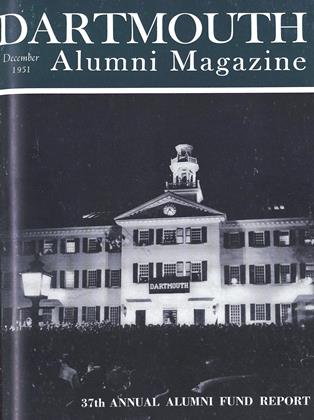For a good many years (more than a century Bob Monahan '39 states in his article this month) the top of Mt. Washington has been tramped by Dartmouth feet. Undergraduates and some of the leaner alumni have arrived at the summit the hard way, by climbing; and many more Dartmouth men have ascended in steamy ease, by riding the cog railway or driving up the winding toll road.
From now on, when students and alumni arrive at the top of New England's highest mountain they will stand on Dartmouth property. As beneficiary under the will of the late Col. Henry N. Teague '00, who died October 2, the College has be- come the owner of the summit of Mt. Washington and of other properties which, under the corporation of the Mt. Washington Club, include the famous cog railway to the top of the mountain, the base station at Fabyans, and the summit hotel.
Colonel Teague's will was admitted to probate in Coos County in late October and the precise extent of the residuary be- quest to Dartmouth College has not yet been determined. The College for many years has held a first mortgage on the rail- way property, and after certain debts and specific bequests have been discharged, it will have complete ownership of these Mt. Washington assets.
The Teague bequest is wholly unre- stricted except for two provisions: one that the College acquire a painting of Daniel Webster arguing the Dartmouth College Case before the United States Supreme Court, and the other that provision be made for a loan fund for students at the Tuck School, from which Colonel Teague was graduated in 1901 as a member of the first class of three men, all now deceased.
The question that nearly* everyone asks is: What is Dartmouth planning to do with its Mt. Washington legacy? There is not even an approximation of an answer to that question yet, and the shaping of an answer will wait upon a study being made for the Trustees by John R. McLane 'O7, chairman of the executive committee of the Board, and John F. Meek '33, Treas- urer of the College.
In view of Dartmouth's outdoor inter- ests and the growth in recent years of its program of arctic studies, it is not difficult to think of exciting curricular and extra- curricular possibilities that have been opened up by Colonel Teague's bequest. In addition, the College has now acquired re- lationships with a variety of year-round ac- tivities at the summit of the mountain. The Mt. Washington Observatory has op- erated there since 1932, and in some of its spare space and in the former Yankee Net- work station a number of testing and sci- entific projects for the armed services and the U. S. Weather Bureau are being car- ried on. Were it not for the problem of getting to the top of the mountain during the long and rugged winter season, even greater scientific use would be made of this unique testing site.
The recreational aspects of Mt. Wash- ington more readily come to mind, but the educational and scientific aspects of Dart- mouth's acquisition could be tremen- dously important. The Trustees have a complicated question to answer, but at the same time it's an intriguing one.
 View Full Issue
View Full Issue
More From This Issue
-
 Class Notes
Class Notes1917
December 1951 By KARL W. KOENIGER, DONALD BROOKS -
 Article
ArticleThe 1951 Alumni Fund
December 1951 By CHARLES J. ZIMMERMAN '23 -
 Class Notes
Class Notes1929
December 1951 By F. WILLIAM ANDRES, EDWIN C. CHINLUND, JACK D. GUNTHER -
 Class Notes
Class Notes1950
December 1951 By ENS. SCOTT C. OLIN, SIMON J. MORAND III -
 Class Notes
Class Notes1935
December 1951 By HENRY R. BANKART JR., JOHN WALLACE, SIDNEY A. DIAMOND -
 Class Notes
Class Notes1946
December 1951 By REGINALD F. PIERCE JR., ROBERT Y. KIMBALL
C.E.W.
-
 Article
ArticleRanlet Bequest
October 1949 By C.E.W. -
 Article
ArticleMiscellany
April 1951 By C.E.W. -
 Feature
FeatureThe 1958 Commencement
July 1958 By C.E.W. -
 Article
ArticleGREETINGS
DECEMBER 1962 By C.E.W. -
 Books
BooksYANKEE DICTIONARY.
OCTOBER 1963 By C.E.W. -
 Feature
FeaturePostwar Change in Dartmouth's Educational Program
APRIL 1966 By C.E.W.







